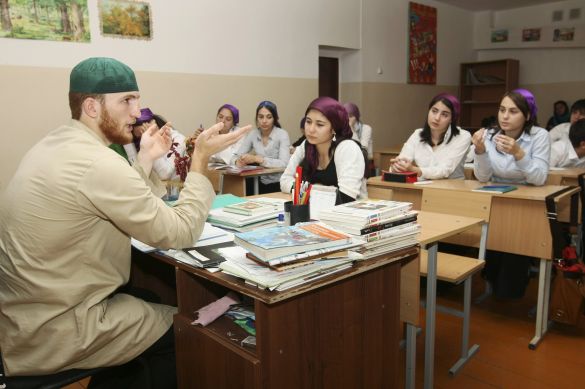
Authorities in Chechnya Seek to Uproot Some Islamic Teachings
Publication: Eurasia Daily Monitor Volume: 11 Issue: 20
By:

A powerful propaganda campaign against Salafism, Habashism and other prominent Islamic teachings was launched in Chechnya in mid-January. Chechen head Ramzan Kadyrov has brought up the issue of fighting unwanted Islamic teachings at every public appearance he has made since them, demanding that all population groups actively fight unwanted Islamic teachings.
At a meeting with the leadership of the Chechen Interior Ministry and commanders on January 15, Kadyrov said that despite some achievements in fighting harmful Islamic teachings, neither law enforcement agencies nor spiritual leaders should be complacent. “You should work together with the local authorities and the spiritual leadership day and night so that even a trace of Wahhabis is effaced from Chechen soil,” Kadyrov told the law enforcement officials (https://chechnya.gov.ru/page.php?r=126&id=14540).
In Kadyrov’s opinion, well-known Islamic scholars approved the Chechen government’s policies at the Islamic Doctrine Against Radicalism conference that took place in Moscow in May 2012. The conference adopted a theological declaration about issues of jihad, sharia norms and the caliphate (https://www.rg.ru/2012/05/28/djihad.html). However, such declarations have been passed by various conferences multiple times and have never had any impact on the situation. These conferences are nothing other than attempts by some parts of the umma to win over the hesitant Muslims who have not yet decided where they stand.
It should be noted that most of the time this type of confrontation takes place at the behest of the local authorities. Moscow decides whom to invite to friendly Islamic conferences. Normally, these are theologians from Kuwait, who have close ties to the Russian Muslim organizations, but regional authorities add their own flavor to the central government’s efforts. At a meeting with the imams of Chechnya’s towns and the republic’s Muslim Spiritual Board on January 23, Ramzan Kadyrov called on them to uproot Wahhabism, Habashism and other radical movements. “Not only will Wahhabism, Habashism and other teachings that contradict the Quran, Sunna and tariqa never exist in Chechnya, but also their very trace will be eradicated,” he declared (https://www.vesti.ru/doc.html?id=1210292).
To strengthen the fight against Islamic radical teachings, Kadyrov announced that the qadi of the Chechen capital would be replaced by Adam Ilyasov, who was previously the imam of one of the multiple mosques in Grozny, in an area close to Berkat marketplace. Kadyrov most likely noticed him because of sermons published on YouTube (https://www.youtube.com/watch?v=10RLabtPohc). The head of Chechnya regarded him as a consistent opponent of Wahhabism.
After meeting with the members of the Spiritual Board of Muslims, Kadyrov met with Chechen ministers and heads of district administrations, asking them to join in their efforts to combat the radicals. Kadyrov decided that the struggle against the radicals would begin first with physical appearance: for example, if a young man has a beard longer than a certain acceptable length, he may be considered a Salafi (https://www.youtube.com/watch?v=emJv0vjLxa8) and can be stopped in the street by government agents. Moreover, if someone’s telephone contains a video with Salafi sermons, that person can be arrested and put on the list of dangerous individuals (https://www.mirislama.com/8807-v-chechne-nachalis-massovye-zaderzhaniya-muzhchin-nosyaschih-borodu-i-zhenschin-v-hidzhabah-video.html). It would be strange to see the sermons of the official Chechen clergy in the telephone handsets of individuals, since the people of the republic do not trust official clerics and consider them part of the secular authorities. Therefore, young people look for alternative sources on Islam and often end up listening to radicals who criticize Sufism on the Internet.
The new practice of putting pressure on young people is unlikely to yield any positive results. The implementation of such heavy-handed policies, and the invasion of people’s privacy through checking their video and audio messages will only further alienate them from the government, not to mention creating a backlash by Chechens eager to learn more about prohibited topics. Young people, in turn, will likely seek the “truth” on the Internet and rejoice in hearing anything that casts the authorities in an unfavorable light, in the same way that ethnic Russians turn to alternative online media to learn about topics related to corruption and government waste.
In a speech broadcast on Chechen TV, Kadyrov pointed out that Chechen State University students had been implicated in many instances of questionable behavior. The authorities immediately decided to install morality police near the entrance to the university who would check the length of beards and prevent those with longer beards from entering. The hijab is not prohibited, but the black hijab that covers the chin is also seen as anti-government and be prosecuted (https://www.kcblog.info/2014/01/blog-post_5751.html?showComment=1390938139588).
According to sources in Chechnya, an official Muslim clergyman recently stood by the entrance to the university and instructed female students how they should dress. All females dressed in black hijabs were prevented from entering the university (https://www.facebook.com/alan.kundukhov?hc_location=timeline).
Several years ago, when Kadyrov gave $1,000 to each woman who agreed to wear the hijab at the university (https://www.kavkaz-uzel.ru/articles/91786/), he probably did not expect that it would become fashionable among young girls and that they would gradually transition to types of hijab that cover the entire face(https://www.youtube.com/watch?v=5ye7o8xagP8). Moreover, the president of Russia Vladimir Putin has called the hijab alien to traditional Islam in Russia (https://www.newsru.com/religy/20dec2012/hijabs.html; for comparison with a similar anti-hijab campaign in China, see “The Language of Terrorism in China,” China Brief, January 9).
After such a statement by the Kremlin, it was no longer possible to promote the hijab in Chechnya. Therefore, the latest anti-hijab campaign by the regional government is an attempt to control a trend inspired by the government itself at a time when it was fighting the Salafis and trying to win over the hearts and the minds of Muslims.
Kadyrov further threatened to find out what Chechen students are being taught in foreign universities and, if necessary, call them in for questioning (https://kavpolit.com/v-chechne-nikogda-ne-budet-terrorizma-vaxxabizma-i-radikalizma/).
Thus, the Chechen authorities are trying to control everything, including styles of dress and the video and audio content of personal cell phones. This will cause a backlash against a government that interferes with the private lives of individuals so brazenly, and more support for the Salafis.




